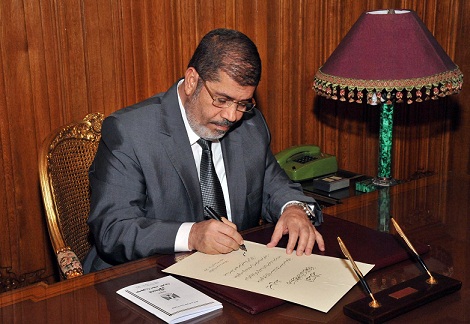CAIRO: As universities gear up for student union elections, students gathered on Monday outside Cairo’s Higher Education Ministry to protest police violence on campuses.
Chanting “get state security out the door” and “beating girls is a red line” some 200 protestors from groups including the April 6 Youth Movement, the Movement for Justice and Freedom and the Resistance Movement took part in the demonstration which had been called following the physical assault by a police officer on female students at Al-Azhar University in Zagazig earlier this month.
The assault occurred after the female student refused to allow a male security officer to search her.
The incident, which happened earlier this month subsequently led to clashes between Al-Azhar University security bodies and Muslim Brotherhood students in Zagazig. Muslim Brotherhood members formed the largest contingent in Monday’s protest, where they stood in orderly, gender-segregated rows.
Hozayfa Hamada, a Helwan University student and member of the Muslim Brotherhood, explained the aims behind the protest.
“Our demands in this protest are getting [police] guards out of the university, having clean and free elections in the university and punishing the people responsible for the recent students’ beatings,” Hamada told Daily News Egypt.
Laila Soueif, a Cairo University professor of mathematics said that she found it “unbelievable” that staff members in the Al-Azhar University in Zagazig where the attack took place have not resigned in protest at the attack.
“The way students are treated is so hurtful. How can we accept something like this?” Soueif said, adding that “from day one of this academic year” there have been crackdowns by security bodies on students.
“The academic year has barely begun and already it’s crazy,” Soueif said.
Opposition political activity is tightly controlled on university campuses. Both students and professors have long complained that security bodies — permanently stationed on university campuses — interfere in all aspects of academic and extracurricular life, from student union elections to the content of student magazines.
“Vetting” by security groups regularly results in the removal of Muslim Brotherhood and left wing candidates from student union elections. Politically active students also complain that they are subject to arbitrary disciplinary tribunals that result in their suspension or expulsion.
Appointments to senior university teaching positions are also subject to vetting by security bodies, according to the the March 9 group of university professors, which campaigns for university freedom.
The interior ministry personnel who police university campuses have no link to universities and are not answerable to them.
In a statement distributed at the protest, the Youth Movement for Justice and Freedom says that the “fist of security controlling universities is merely a reflection of a dictatorial regime controlling the country as a whole”.
Yasser El-Hawary, media coordinator of the Youth Movement for Justice and Freedom, told Daily News Egypt that students “want to induce a turning point in the history of student movements”.
“We want to be allowed to practice student politics. This doesn’t corrupt college life; it gives us experience to be able to practice politics outside of college and that’s why they are holding us back. They don’t want us to practice politics either inside or outside college,” El-Hawary said.
The State Council will deliver a decision in a long-running case challenging the constitutionality of the presence of security bodies on Saturday.


